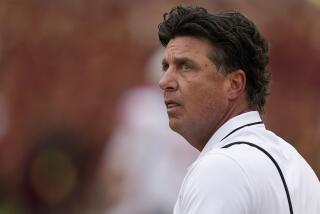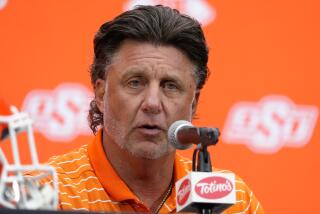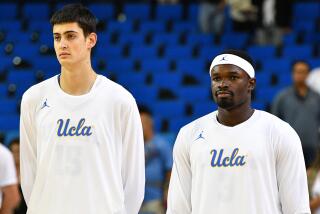Making His Point
- Share via
NORTHRIDGE — Bobby Braswell had been men’s basketball coach at Cal State Northridge for only a few hours last May when Lucky Grundy pressed the note into his hand.
It began with the standard congratulatory stuff but ended with an eye-opening statement.
“By the end of the [season],” the note said, “I’m going to be your starting point guard.”
“Yeah, right,” Braswell remembers thinking. “I don’t know how seriously to take anything like that.”
A veteran of eight seasons as a Division I assistant, Braswell had been around the game long enough to know one thing: Walk-ons don’t start.
Of course, he hadn’t been around the program at Northridge, where most of what applies to the rest of the college basketball world goes out the window.
And he hadn’t been around Alvis Evert Grundy--nicknamed Lucky by his grandmother because she used to say he was lucky to have a mom like his--to fully understand what goes on in the player’s head.
Grundy’s overwhelming confidence and his strong faith in God are closely related. The junior knew he would become a starter at Northridge, he said, because that’s what he prayed would happen.
This is a guy who insists he is going to play in the NBA. Not that he hopes to play or wants to play. In his mind, he is going to play.
“Like any relationship, I talk to God and he talks to me,” Grundy said. “He tells me what he wants and I tell him what I want. One of the things I want is to go to the NBA and that’s one of the things he told me I would do, just like when he told me I would play here.”
Never mind that there’s a slight difference between Northridge and the NBA. Or that this 6-foot, 165-pound pile of knees and elbows didn’t even play organized basketball until the summer before his senior year at Santa Monica High. Or that he probably only made the team at Northridge because of a robot-like capacity to run endless sprints without dropping.
“He’s always had a tremendous amount of confidence, always,” said Northridge assistant Mike Johnson, who learned of Grundy’s endurance and determination while unsuccessfully trying to run him off the team. “Up until this point, he never really had a great opportunity to prove that he was a good player.”
That opportunity came on Nov. 30, when Northridge played Loyola Marymount. Starter Trenton Cross left the game in the first half with a rib injury. Grundy took over the team and nearly rallied the Matadors from a 27-point deficit before losing by three. In the next game, at UCLA of all places, Grundy made his first college start.
“It’s a great thing to start, period,” Grundy said, “and when you start in a historic place like that, it’s like, whoa. You try to just stay focused and not look at all the bright lights and the TV and the family [in the stands].
“You just really try not to throw up.”
Cross’ ribs healed quickly, but by then Grundy had taken a stranglehold of the starting job. Grundy, who has started 14 games in a row, has averaged 7.5 points and 3.5 assists, and has shot a team-leading 48.6% from three-point range and 83.7% from the free-throw line. He has peaked lately, scoring 31 points in Northridge’s two games leading to tonight’s Big Sky Conference showdown against first-place Northern Arizona.
“I always knew he could play,” said junior forward Kevin Taylor, “but he’s raised his game to another level this year.”
As the starts have piled up, Grundy has grown more and more comfortable in the leadership role his position demands. And his teammates have grown more accustomed to taking orders from the guy who used to spend most of his time sitting clapping at the end of the bench.
“You can see and hear the players react to him differently than the way they were reacting to him earlier in the [season],” Braswell said. “There is no doubt in my mind that he was won the respect of every player in the program.”
Winning his teammates’ respect capped a battle Grundy began 3 1/2 years ago.
Northridge coaches didn’t think much of Grundy’s skills when he first showed up in the fall of 1993 and tried out for the team.
“I tried [during] conditioning to run him out,” Johnson said. “I really tried hard. And he would come in first in every conditioning thing we did. And he had a great attitude, for the most part, and he just kept working and kept plugging and he made the team.”
In each of his first three seasons, Grundy had to try out for the team during conditioning. It wasn’t so tough for him, though--he had been running track longer than he’d been playing basketball.
“If you could run, you could make the team,” he said. “I made the team my first couple years just by outlasting everyone I guess.”
Grundy was a redshirt in 1993-94, and the following season he played only 69 minutes in 11 games. Last season, things started to break for Grundy. He worked his way into 25 of 27 games, averaging a little more than 10 minutes, and established himself as a sparkplug Coach Pete Cassidy could use when the team was sluggish.
But all that Grundy had done last season meant nothing to Braswell at first. As a walk-on, Grundy was thrown into the mix with about 60 other players who hoped to win a spot on the team after a three-day tryout. Although he kept Grundy, Braswell remained skeptical. Even after Grundy became a starter, Braswell wondered how long the walk-on could keep playing well. Braswell admits he was almost waiting for Grundy to sink to the level that made him a walk-on. But so far, Grundy has been fairly reliable.
“I think the team feeds off his energy defensively because he really gets into people and pressures the ball really well,” Braswell said. “The team gets into his energy offensively because he pushes the ball the way I want to push the ball.”
Grundy’s consistently solid play begs the question: Has he earned his way out of walk-on status for next season?
“All I can say on that issue is I’m going to do what’s fair and what is right for the program,” said Braswell, who already has a problem because there are 14 other players expecting scholarships, one over the NCAA limit.
So Grundy’s best hope is that at least two players quit, transfer or come up with academic problems. But wishing for that sort of thing would be out of character for Grundy.
“I would still play [next year as a walk-on],” he said, “and I would still have just as much fun as I’m having now.”
More to Read
Go beyond the scoreboard
Get the latest on L.A.'s teams in the daily Sports Report newsletter.
You may occasionally receive promotional content from the Los Angeles Times.










